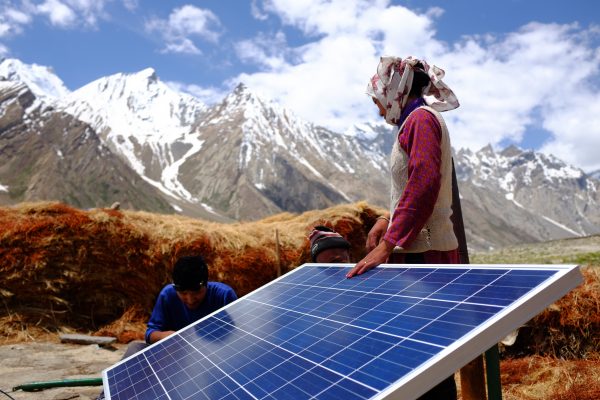Empowerment of 70,000 People in Remote, Marginalized Communities
Since its inception in 2010, IEEE Smart Village (ISV) and the local entrepreneurs it supports have empowered more than 70,000 people in some of the world’s most remote and marginalized communities. This empowerment comes from implementing ISV’s three strategic pillars: Energy, education and enterprise. By deploying these pillars at a local level, ISV’s efforts lead to prosperity in rural areas around the world – strategically supporting multiple United Nations’ Sustainable Development Goals and the quest to end poverty.
Using lessons learned over the past eight years, ISV and the original local entrepreneurs are expanding their efforts. An exemplary story of success: Green Village Electricity (GVE) Projects in Nigeria has leveraged the seed funding, experience and technical support from their pilot project with ISV to raise $3.5 million USD of low-interest loans from the Nigerian Bank of Industry to expand their program throughout six states in rural Nigeria. Their next expansion will lead to 1,200 direct and indirect construction jobs, 320 to be filled by women, as well as 80 operational jobs with 32 filled by women. Once this phase is complete, GVE will continue through subsequent development phases to electrify 500 villages, reaching a population of 1,000,000 rural Nigerians by 2023. ISV’s ability to educate and empower local entrepreneurs is the critical component that ensures the sustainability and scalability of their development efforts.
Along with GVE, other entrepreneurs who began their energy and education programs in the early years of ISV, such as the Global Himalayan Expedition (GHE), are now scaling. To date, GHE has electrified 55 villages, reaching 20,000 people in the remote Himalayan region of Ladakh, India. On the other side of the world, a tragic natural disaster has led to a total loss of ISV’s initial program. The local entrepreneurs in Haiti and the communities they developed with ISV’s support were in the direct track of the 2016 hurricane Matthew. The original Smart Village plus new equipment serving 3,000 homes were decimated. ISV is investigating how best to reengage with those communities to address their humanitarian and development needs.
While supporting the scaling of existing programs, ISV continually initiates relationships with new entrepreneurs. In 2017, eight new projects passed ISV’s vetting process and are now receiving seed funds to launch their programs. New projects, with total funding approaching $1.2 million USD, are underway in Cameroon, Nigeria, India, Uganda, and Papua New Guinea.
While providing direct start-up support to local entrepreneurs, ISV actively pursues partnerships with local government, development agencies and NGOs to maximize development efficiency. The exciting new program underway in Papua New Guinea is led byMadan Community Smart Village and is supported by both ISV and Rotary International. This pilot program will initially serve 4,000 people in the Madan area of Jiwaka Province. The joint effort provides off-grid electrification and a combination of internet-intranet connectivity for 30 schools, three community centers and several medical clinics and birthing centers. ISV provides the power supply for these communities using their SunBlazer III technology, while Rotary International provides expertise in clean water, sanitation and hygiene (WASH) to expand clean water delivery to Madan’s villages and medical centers. Following a successful pilot, a planned expansion will serve an additional 44,000 people. All seed funded startups have the long term goal to reach one million beneficiaries.
The ISV education model is developed with strong community leadership and deploys digital classrooms with modernized curricula, laptops, tablets, projectors and educational toolboxes. Communication is provided using internet and private intranet connections. Three pilot projects are under development: 1) 30+ schools in Madan Papua New Guinea, 2) 30+ schools in Maasai villages in Kenya, and 3) training 10,000 teachersin the Mekong Delta of Vietnam to develop curricula for all ages,reaching millions throughout the country. The experience acquired through these pilot projects will be leveraged to generate rural education programs around the globe.
As new programs take root and initial programs scale, the measurable positive impact of ISV’s work will substantially grow. ISV will continue to monitor the successes and constraints for all projects, using lessons learned to support the efforts led by local entrepreneurs. Driven by the multipronged strategy that electrifies rural communities, educates villagers and empowers entrepreneurs, ISV’s program will continue to catalyze sustainable development around the world.
We enthusiastically welcome your support and involvement at this critical moment in the IEEE Smart Village program; Please join us at: ieee-smart-village.org and the IEEE Foundation Smart Village donation page: https://www.ieeefoundation.org/smart-village.
Douglas Mackenzie
ISV Volunteer, Johns Hopkins Economics Graduate Student
Black & Veatch Electrical Engineer



